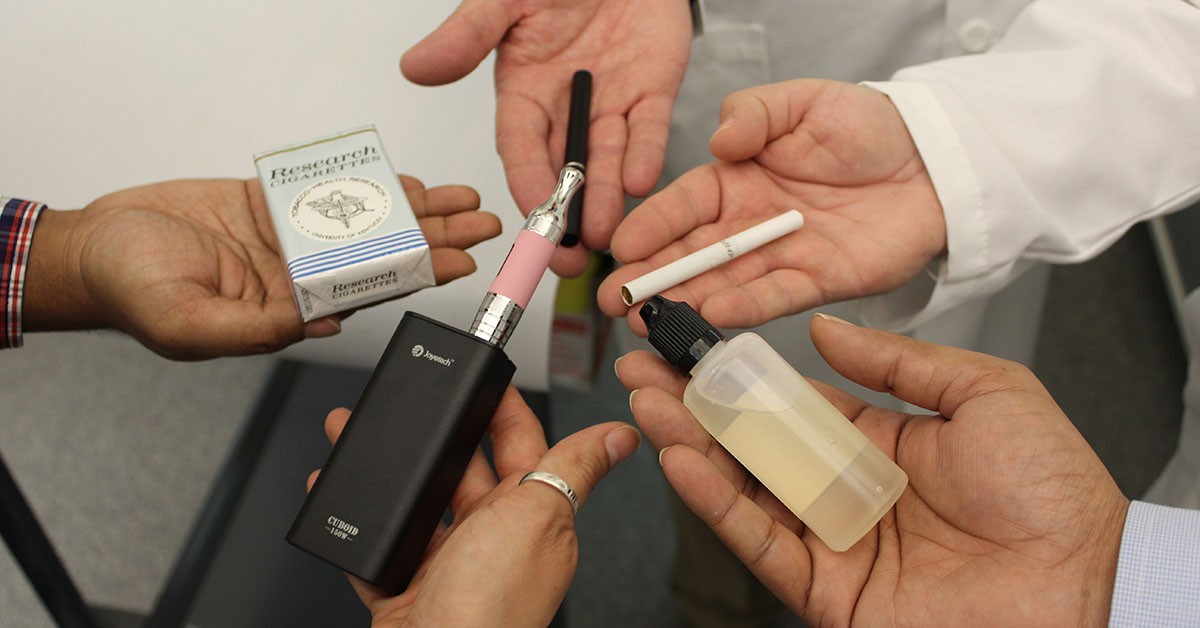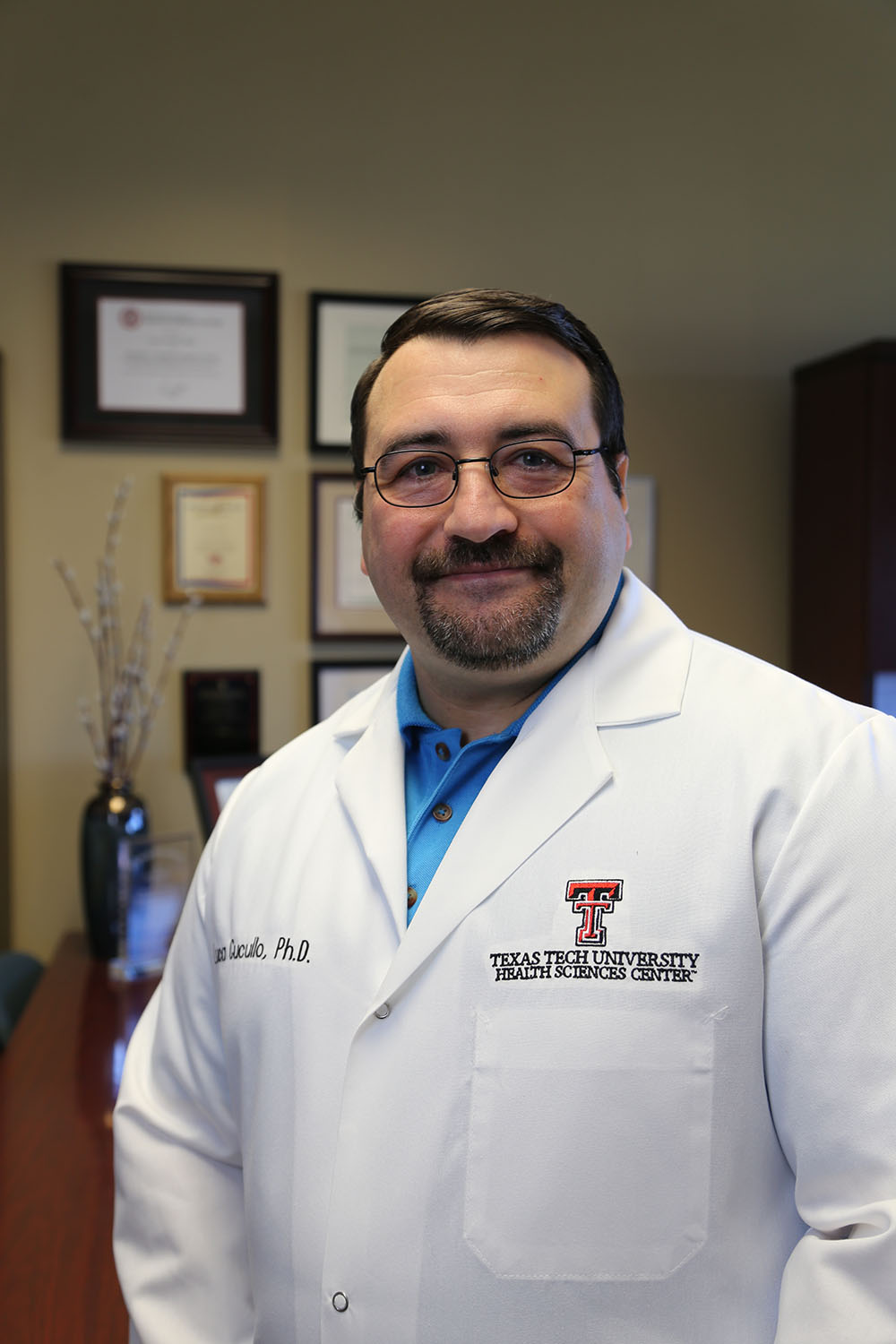Study Suggests Increased Risks for COVID-19 Patients Who Smoke, Vape
TTUHSC Researchers Look for Links Between Virus and Stroke

As the SARS-CoV-2 virus, or COVID-19 has unfurled its tentacles across the globe, the severe respiratory and pulmonary disorders associated with the infection have become well known. However, recent case studies also have strongly suggested the presence of cerebrovascular-neurological dysfunction in COVID-19 patients, including large artery ischemic strokes that originate in one of the brain’s larger blood-supplying arteries such as the carotid.
Luca Cucullo, Ph.D., and other researchers from the Texas Tech University Health Sciences Center (TTUHSC) have for years studied the effects smoking and vaping have on the cerebrovascular and neurological systems. Their research, and that of others, has shown smokers of tobacco and vaping products are more vulnerable to viral and bacterial infection than are non-smokers.
Based on those findings and the recent COVID-19 patient case studies, Cucullo and TTUHSC graduate research assistant Sabrina Rahman Archie reviewed the role smoking and vaping may play in the cerebrovascular and neurological dysfunction of those who contract the virus. Their study, “Cerebrovascular and Neurological Dysfunction under the Threat of COVID-19: Is There a Comorbid Role for Smoking and Vaping?” was published May 30 in the International Journal of Molecular Sciences.
In his previous research, Cucullo demonstrated how tobacco smoke can impair a person’s respiratory function. From there, it can affect the vascular system and eventually the brain. Because COVID-19 also attacks the respiratory and vascular systems, he and Archie wanted to see if there were any reported cases indicating the virus may also affect the brain and lead to the onset of long-term neurological disorders like ischemic strokes. They also looked for evidence showing smoking and vaping can otherwise worsen the outcomes for COVID-19 patients, which Cucullo said seems to be the case.
Archie said some case studies demonstrate there are indeed stroke occurrences in COVID-19 patients and the rates appear to be increasing every day. In fact, one study comprised of 214 patients found that 36.45% of COVID patients had neurological symptoms, further indicating the virus is able to affect the cerebral vascular system. But how does this happen?
There are within the human body approximately 13 blood coagulation factors that can be increased due to hypoxia, a condition that occurs when the body is deprived of sufficient amounts of oxygen at the tissue level, as occurs with smoking. Archie said COVID-19 appears to also raise some blood procoagulant, especially the von Wellebrand Factor, a blood clotting protein that primarily binds carries coagulation factor VIII and promotes platelet adhesion at the site of wounds.

“When the coagulant factor will be increased in our body, there will be a higher chance of clot formation,” Archie explained. “Ultimately, it will be responsible for several vascular dysfunctions, for example, hemorrhagic or ischemic stroke.”
Because COVID-19 and smoking or vaping each increases blood coagulation factors that may eventually affect the cerebral vascular system, Cucullo believes the stroke risk may be higher still for COVID-19 patients who smoke.
“COVID-19 seems to have this ability to increase the risk for blood coagulation, as does smoke,” Cucullo added. “This may ultimately translate in higher risk for stroke.”
Recent clinical study data also shows some of the damage caused by COVID-19, especially to the respiratory system, is permanent. Cucullo said the same data indicates that patients who recover from COVID-19 still have an elevated risk for stroke and that age and physical activity don’t seem to be factors. Some of those with the highest risk factors for long-term problems related to COVID-19 are young adults in their 20s and 30s who were active and considered to be in their physical prime.
“After COVID-19, some of those can barely take few steps without having breathing issues, so the recovery, it's kind of formal recovering, but some of these long-term effects remain,” he added.
In addition to impairing the immune and vascular systems and triggering cerebrovascular and neurological dysfunction, smoking and vaping often worsen the outcomes for patients who contract influenza or other respiratory or pulmonary diseases. Because COVID-19 appears to affect many of the same systems within the body, Cucullo said it would seem logical to think the health risks are increased for COVID-19 patients who smoke, but the virus is too new to know for certain.
“We don't even know whether COVID-19 can get into the brain because nobody has actually checked for it yet,” Cucullo said. “I think it's very early for this kind of study; the prime clinical concern is either a vaccine or trying to alleviate the symptoms, in particular the respiratory symptoms, so they didn't even get that far. We are planning to do something from that point of view; this is something we will definitely research.”
Related Stories
Celebrating Veterans: TTUHSC’s General Martin Clay’s Legacy of Service and Leadership
From his initial enlistment in the Army National Guard 36 years ago to his leadership in military and civilian health care management roles, Major General Martin Clay’s career has been shaped by adaptability, mission focus and service to others.
Texas Tech University Health Sciences Center School of Nursing Named Best Accelerated Bachelor of Science in Nursing Program in Texas
The TTUHSC School of Nursing Accelerated Bachelor of Science in Nursing (BSN) program has been ranked the No. 1 accelerated nursing program in Texas by RegisteredNursing.org.
TTUHSC Names New Regional Dean for the School of Nursing
Louise Rice, DNP, RN, has been named regional dean of the TTUHSC School of Nursing on the Amarillo campus.
Recent Stories
The John Wayne Cancer Foundation Surgical Oncology Fellowship Program at Texas Tech University Health Sciences Center Announced
TTUHSC is collaborating with the John Wayne Cancer Foundation and has established the Big Cure Endowment, which supports the university’s efforts to reduce cancer incidence and increase survivability of people in rural and underserved areas.
TTUHSC Receives $1 Million Gift from Amarillo National Bank to Expand and Enhance Pediatric Care in the Panhandle
TTUHSC School of Medicine leaders accepted a $1 million philanthropic gift from Amarillo National Bank on Tuesday (Feb. 10), marking a transformational investment in pediatric care for the Texas Panhandle.
Texas Tech University Health Sciences Center Permian Basin Announces Pediatric Residency Program Gift
TTUHSC Permian Basin, along with the Permian Strategic Partnership and the Scharbauer Foundation, Feb. 5 announced a gift that will fund a new pediatric residency.

